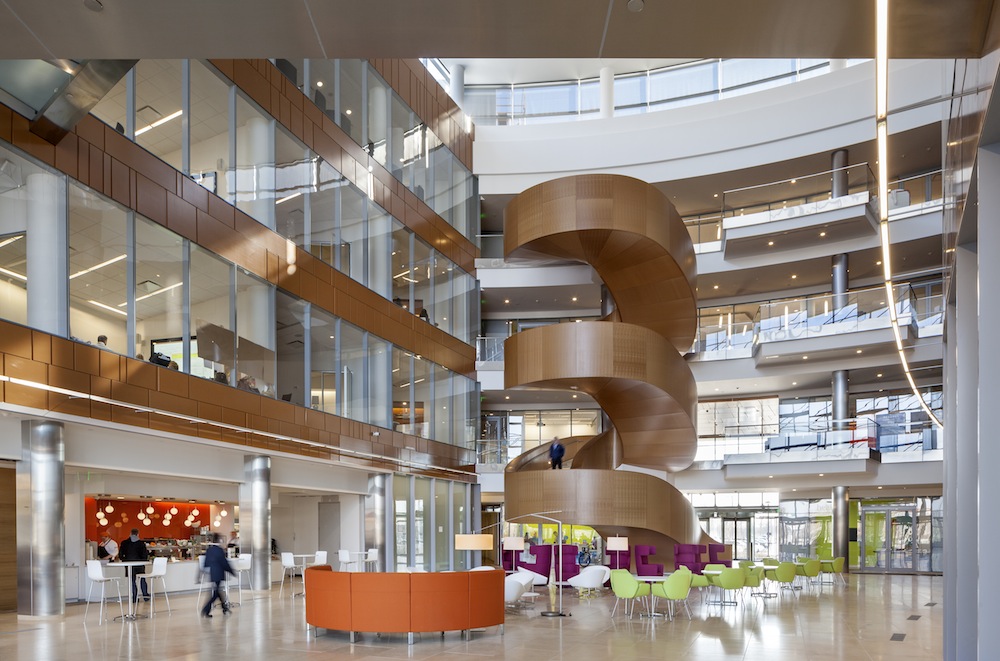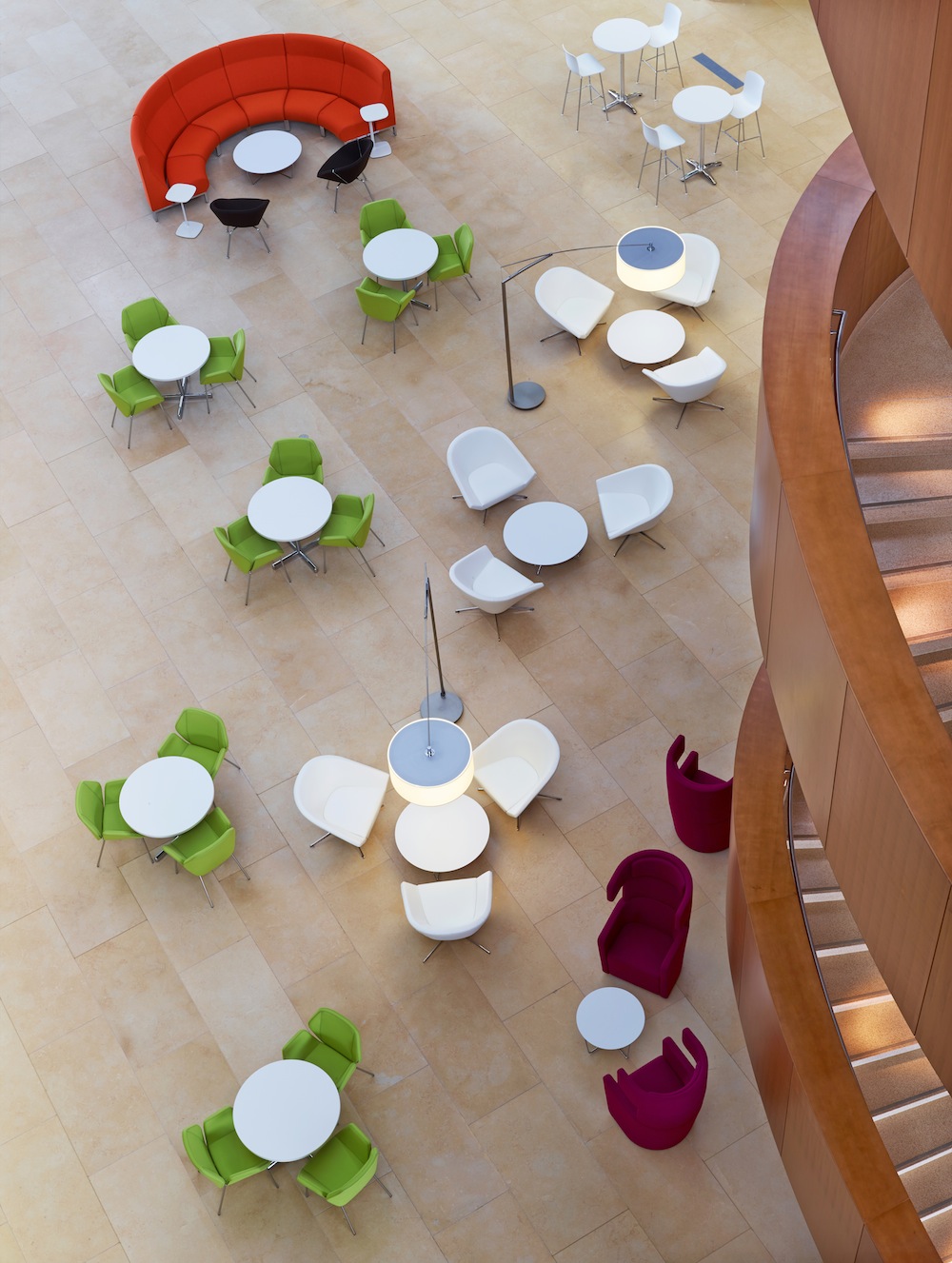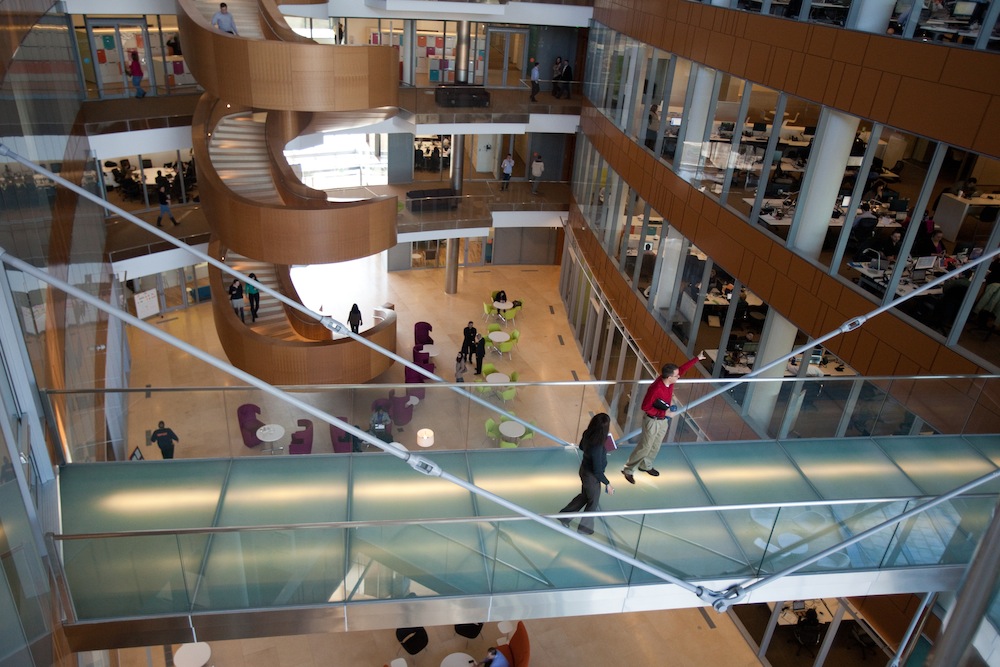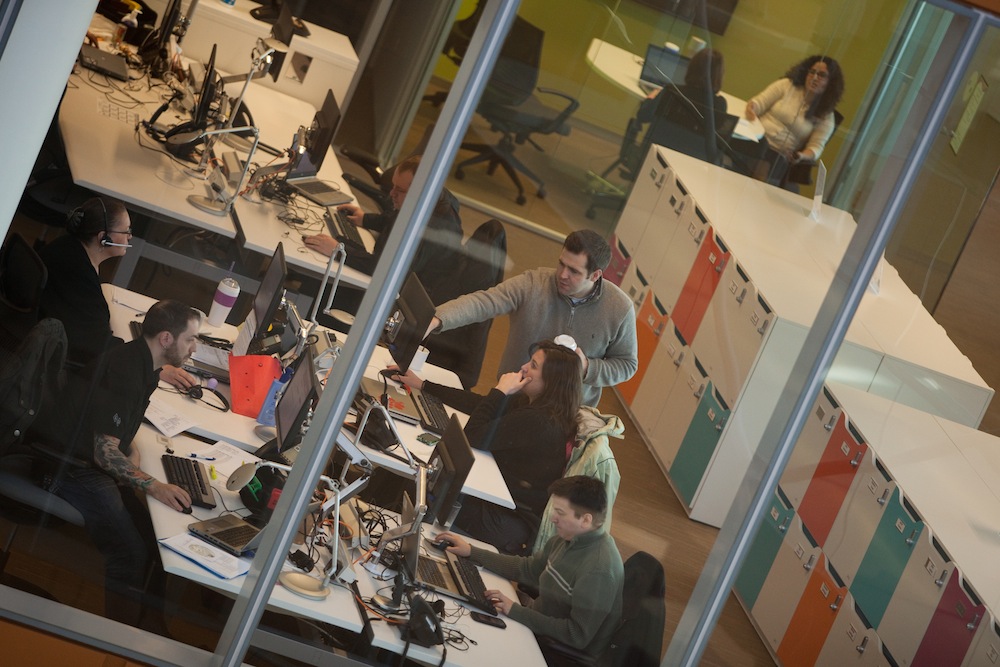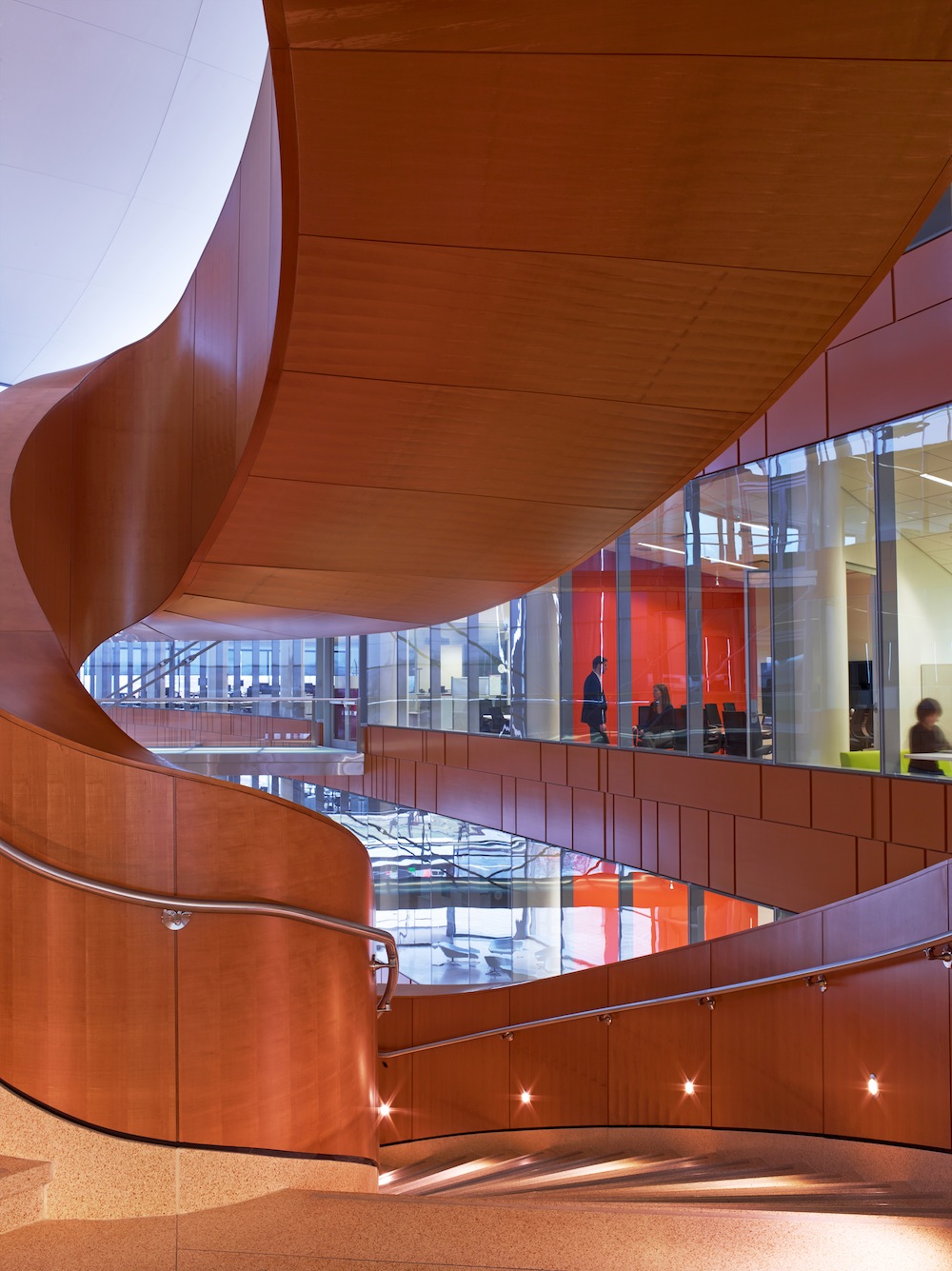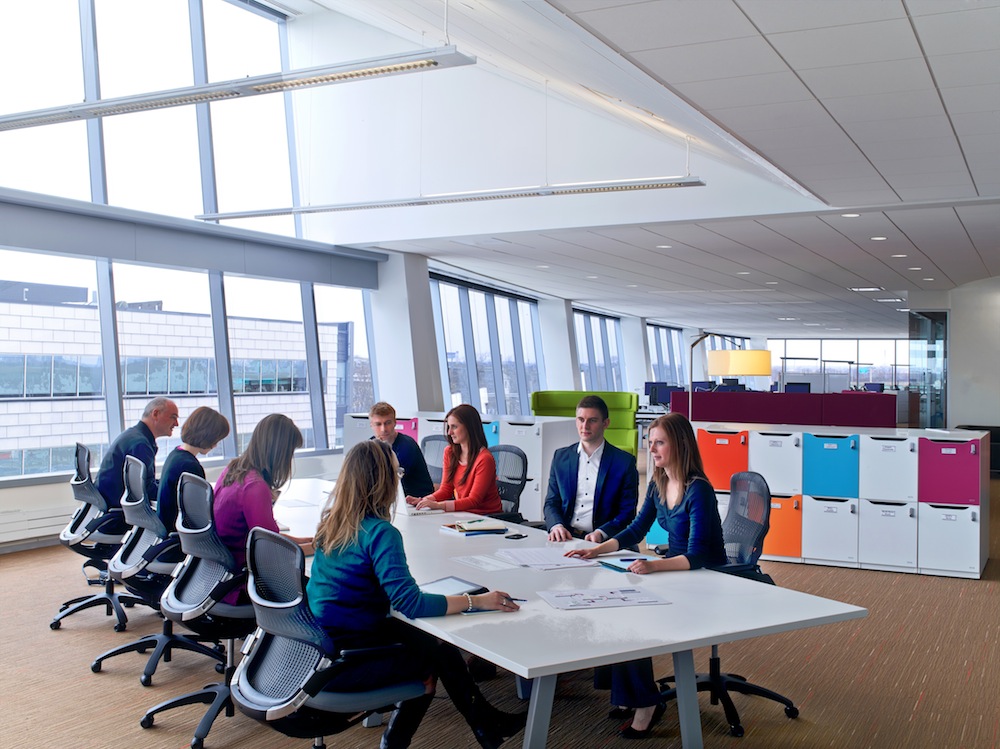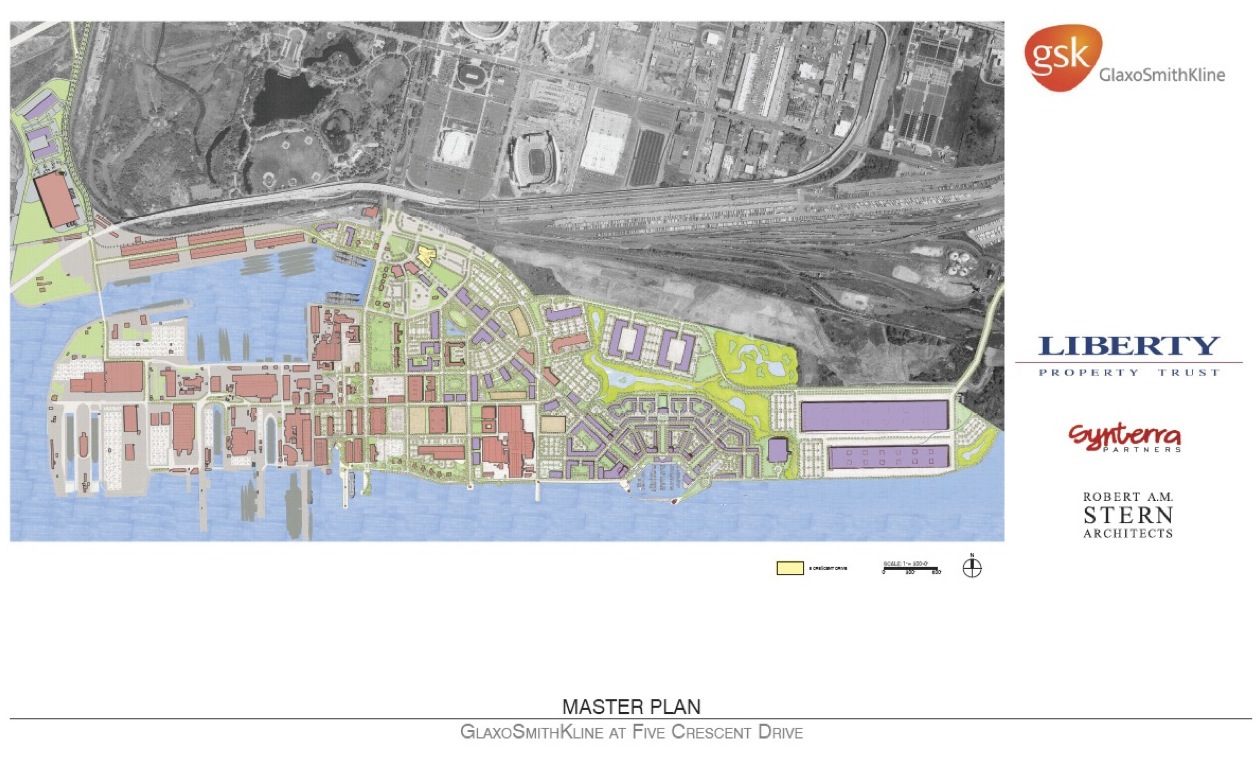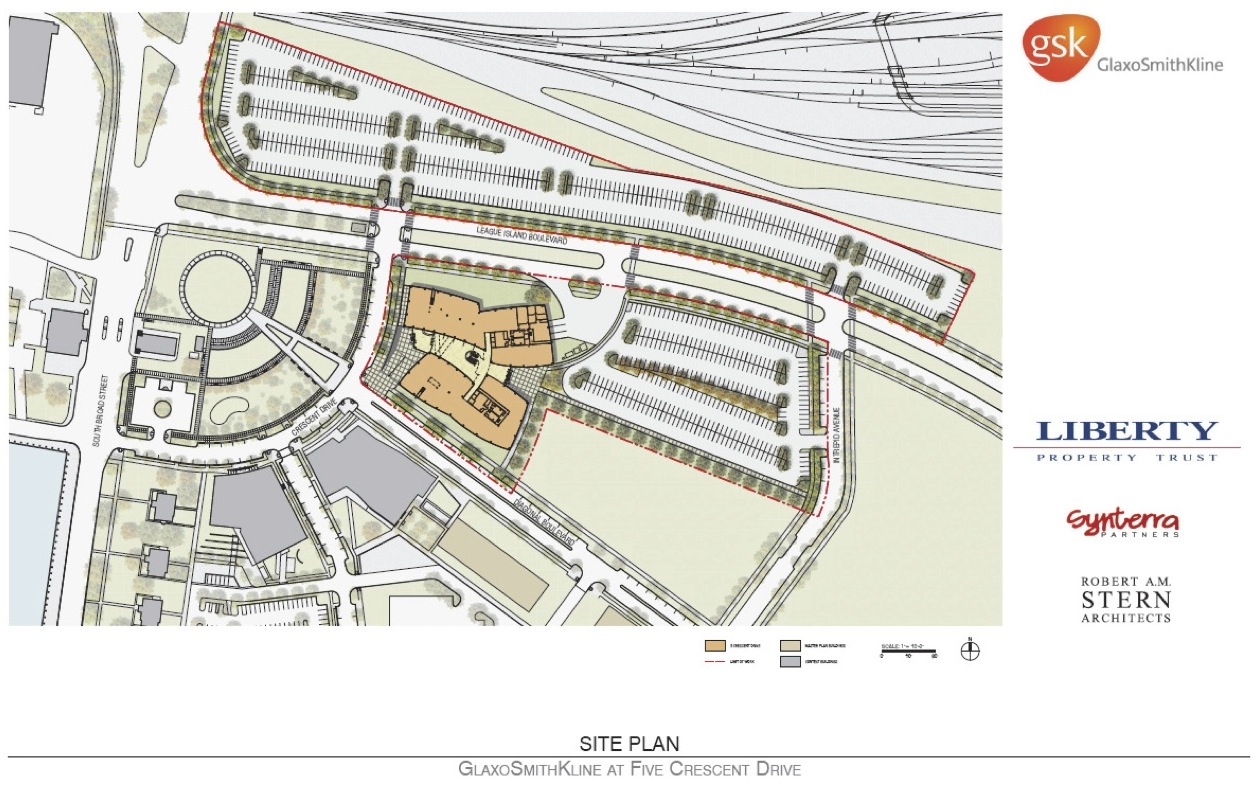GlaxoSmithKline officially opened its new double LEED Platinum certified facility in Philadelphia’s Navy Yard Corporate Center earlier today, ushering in a new era of how people work in Philadelphia. Employees, families and friends celebrated a ribbon-cutting ceremony with GSK President of North America Pharmaceuticals Deirdre Connelly, Liberty Property Trust Chief Executive Officer Bill Hankowsky, Synterra Partners Principal Bill Wilson, design architect Robert A.M. Stern, workplace strategist and interior architect Francis Cauffman Principal John Campbell and Philadelphia Mayor Michael A. Nutter.
“Our new work space is designed to inspire and connect people,” says Deirdre Connelly, President, North America Pharmaceuticals, GSK. “My teammates and I are energized by this new environment, where we can do our best work and collaborate without the constraints of office walls.”
The 208,000 square foot building at Five Crescent Drive represents an $80 million investment by Liberty Property/Synterra, and an investment of approximately $70 million by GSK. GSK has signed a 15.5-year lease at the building, which includes a four-story central atrium, a monumental stairway, a coffee shop, cafeteria, fitness center, meeting centers and a large multi-purpose room.
“GSK’s new facility reflects the reality of The Navy Yard: it is a Philadelphia magnet for creative, forward-looking companies,” said Bill Hankowsky, Chief Executive Officer, Liberty Property Trust. “Innovation and growth are now synonymous with this dynamic environment.”
Photo: Francis Dzikowski / Esto for Robert A.M. Stern Architects, LLP
The four-story, glass-encased building with an open floor plan and grand central staircase has been awarded both Core & Shell™ and Commercial Interiors™ LEED® Platinum certification from the U.S. Green Building Council. It is the first double LEED® Platinum building in Philadelphia. It is anticipated that the innovative building systems will save as much as 30% of energy use when compared to a traditional building.
These substantial energy savings are the result of the state-of-the-art building façade and high-performance glass which maximize daylight in winter while reducing heat gain and providing shading in summer. ENERGY STAR-rated lighting and equipment, as well as an astronomical time clock and cloud sensor program, activate the automatic shades on windows to control glare. In addition smart meters track and monitor the building’s energy and water use and provide ongoing accountability for utility consumption and performance.
Photo: Francis Dzikowski / Esto for Robert A.M. Stern Architects, LLP
“It was GSK’s commitment to Philadelphia that put The Navy Yard well over the 10,000 employee mark,” said Mayor Michael A. Nutter. “Just 18 months ago we stood here to break ground on this project, and I am thrilled to be here today to celebrate the grand opening of one of the most innovative, healthy, and green work spaces in the US.
Sweeping views of Philadelphia are accessible from nearly 90% of the workspaces. In the office-less layout, employees are located in “neighborhoods” and can work in a variety of settings throughout the day. These include custom-designed sit-to-stand workstations, team tables, meeting areas, social areas with soft seating, and quiet rooms.
“Francis Cauffman is very excited to see employees working and interacting throughout the entire building, and to hear the highly positive employee response to their new workplace,” said John B. Campbell, LEED AP, AIA, RIBA, Principal-in-Charge of Workplace Strategies at Francis Cauffman. “By creating an open and healthy workplace environment focused on providing the right physical and IT tools with a wide variety of work settings throughout the building, the new workplace has transformed the level of energy, engagement and connectivity across the organization.”
Photo: Eric Laignel for Francis Cauffman
Daily service to and from Center City via The Navy Yard Express Shuttle along with plentiful parking and key amenities, such as parks with Wi-Fi access and recreational activities and the soon-to-be-completed Courtyard by Marriott, a flagship property with an upscale bar and restaurant, attract employees to a unique and vibrant setting.
Innovation and sustainability from top to bottom
Whether one starts on the top of the building, which offers a green rooftop, or at the front door apron which features Five Standards (Dazzle), a Mural Arts Program commissioned piece of public art by Virgil Marti, GlaxoSmithKline at The Navy Yard delivers excitement and energy. The five 16’ x 7’ foot steel and mirror polished stainless steel sculptures resemble looking glasses; their design fitting seamlessly along the GSK facade, which appears as a large transparent ship docked at Five Crescent Drive.
The roof is covered 40% with vegetation and an herb garden provides many benefits including: reducing energy costs by providing natural insulation; absorbing storm water reducing the burden on the public storm water system; offering a beautiful space for events and meetings; and providing additional workspace for employees. High-efficiency, low-flow plumbing fixtures are expected to reduce water use by as much as 50% as compared to a traditional building, which will save an estimated 1.8 million gallons of water per year.?
The building’s ventilation system provides 30% more fresh air than required by code and monitored by carbon dioxide sensors installed at high-density spaces which increase the amount of fresh air in those spaces as carbon dioxide levels increase. The GSK facility and its grounds have been designated as a non-smoking site.?
For more about the building, visit http://us.gsk.com/html/media-news/navy-yard-press-kit.html.
Photo: Francis Dzikowski / Esto for Robert A.M. Stern Architects, LLP
Photo: Francis Dzikowski / Esto for Robert A.M. Stern Architects, LLP
Photo: Eric Laignel for Francis Cauffman
Photo: Eric Laignel for Francis Cauffman
Related Stories
| Aug 11, 2010
ZweigWhite names its fastest-growing architecture, engineering, and environmental firms
Management consulting and research firm ZweigWhite has identified the 200 fastest-growing architecture, engineering, and environmental consulting firms in the U.S. and Canada for its annual ranking, The Zweig Letter Hot Firm List. This annual list features the design and environmental firms that have outperformed the economy and competitors to become industry leaders.
| Aug 11, 2010
SSOE, Fluor among nation's largest industrial building design firms
A ranking of the Top 75 Industrial Design Firms based on Building Design+Construction's 2009 Giants 300 survey. For more Giants 300 rankings, visit http://www.BDCnetwork.com/Giants
| Aug 11, 2010
Guggenheim to host live online discussion of Frank Lloyd Wright exhibition
The Solomon R. Guggenheim Museum launches the Guggenheim Forum, a new series of moderated online discussions among experts from a variety of fields that will occur in conjunction with major museum exhibitions.
| Aug 11, 2010
Best AEC Firms of 2011/12
Later this year, we will launch Best AEC Firms 2012. We’re looking for firms that create truly positive workplaces for their AEC professionals and support staff. Keep an eye on this page for entry information. +
| Aug 11, 2010
Report: Building codes and regulations impede progress toward uber-green buildings
The enthusiasm for super green Living Buildings continues unabated, but a key stumbling block to the growth of this highest level of green building performance is an existing set of codes and regulations. A new report by the Cascadia Region Green Building Council entitled "Code, Regulatory and Systemic Barriers Affecting Living Building Projects" presents a case for fundamental reassessment of building codes.
| Aug 11, 2010
Call for entries: Building enclosure design awards
The Boston Society of Architects and the Boston chapter of the Building Enclosure Council (BEC-Boston) have announced a High Performance Building award that will assess building enclosure innovation through the demonstrated design, construction, and operation of the building enclosure.
| Aug 11, 2010
Portland Cement Association offers blast resistant design guide for reinforced concrete structures
Developed for designers and engineers, "Blast Resistant Design Guide for Reinforced Concrete Structures" provides a practical treatment of the design of cast-in-place reinforced concrete structures to resist the effects of blast loads. It explains the principles of blast-resistant design, and how to determine the kind and degree of resistance a structure needs as well as how to specify the required materials and details.


